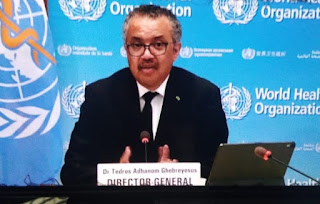Norway to support WHO in testing highly effective evidence-based tools & measures to low down pandemic impact across globe
In these trying times during pandemic, when most of the countries in the world are facing crisis to knock down the impact of pandemic and restore normalcy, Norway came forward to support the World Health Organisation in testing highly effective evidence-based Public Health and Social Intervention (PHSI)-based tools and measures to fight the impact of pandemic across the globe.
 |
| Media Briefing on PHSIs |
 |
| WHO chief Dr. Tedros Adhanom Ghebreyesus |
Citing an example of the United Kingdom, he narrated that 60 percent
of its population were fully vaccinated and yet the country is looming under a
possible-third COVID wave strike, resulting in the delay of the opening of society
for many more months”. He further added that the world has learned a lot during
this pandemic but it was essential to document evidence-based PHSIs to fight such
public health emergencies across the world.
He also laid stress on developing vaccines against many such
viruses that take away thousands of lives annually, and later hailed the efforts
of scientists and researchers all over the world to develop effective vaccines
for SARS-CoV-2 in a record time.
It is to be noted that despite decades of trying to develop licensed
vaccines, the world still does not have any long-lasting treatment for viruses like HIV,
respiratory syncytial virus and cancer causing Epstein Barr virus and for other
few diseases like chikungunya, dengue, malaria, hookworm diseases, chagas etc, which,
are popularly known as neglected tropical diseases (NTDs) affecting most of the poor
nations in tropical areas.
Understanding of the disease and its variants and to develop counter
measures is very important. The minister also mentioned that the publishing
websites uploaded nearly 2000 scientific articles on vaccines and treatments
contrast to 12 articles over the effect of closing different parts of the society.
Hence, it became obligatory to work on an extensive research with a defined
methodological approach to fight any other pandemic that might
behave differently from the current one.
He insisted on three of the most important tasks to accelerate
the research initiative in getting the highly effective measures and tools to
curb down COVID-19 pandemic and other unforeseen circumstances that could
strike earth in coming years- a) to
extract to the maximum extent possible impact as well as the social and economic
cost of the different PHSIs used during pandemic. b) to research on COVID-19
and relatively respiratory infections, to develop tools such improved face masks.
Other tools like the use of data and artificial intelligence to track local
outbreaks. c) to develop research methodologies to be used at the next pandemic
(when it hits the earth) that will provide the evidence on the benefits and
cost of each interventions separately and in combination with others. This
initiative, thus, would be able to develop a tool box to be used to face any unforeseen
public health emergency.
Norway along with other Nordic countries had adopted the
culture of working from home since March 2020. All the kindergartens and schools
were closed throughout the pandemic. All the sports, cultural events and public
places remained shut for a longer period of time. The local authorities applied
stringent efforts all over the places to cut down the impact of COVID-19
pandemic.
#COVID19 #MediaBriefing #WHO #Norway #PHSIs #Health #Tools #Measures #CounterPandemic #ResearchInitiative


.jpg)

Comments
Post a Comment